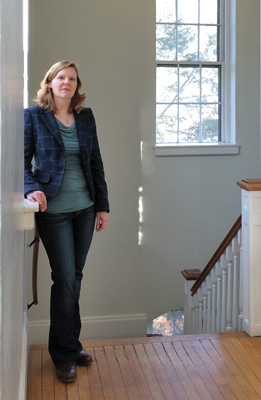By William Sweet
With $50,000 each, one professor is writing about the Holocaust, while another examines an age-old question about life itself.
[Research] Two professors have received more than $50,000 each from the National Endowment for the Humanities to publish their research. The results will be, in one case, a book about an overlooked chapter from the history of the Holocaust, and in the other, a philosophical exploration of some of our basic assumptions about ordinary life.
Sara J. Brenneis, assistant professor of Spanish, will use her grant to write a book about the experiences of non-Jews from Spain who were deported to the Mauthausen-Gusen concentration camp in Austria. Some 7,000 Spaniards were sent to Mauthausen for their opposition to the government of Francisco Franco.
“The Spanish experience of Mauthausen was distinct in many ways from the Jewish experience of the Holocaust, but few people are even aware that Spaniards were imprisoned and killed by the Nazis,” Brenneis says. Her research examines narrative fiction, film, memoir and historiography inspired by the experiences of Spaniards in Mauthausen. “Spanish authors, filmmakers and scholars,” she says, “continue to grapple with the Holocaust’s cultural legacy in Spain.”

Brenneis is writing a book about non-Jews from Spain who were deported to a Nazi camp.
Photo by Rob Mattson
Jonathan Vogel, the George Lyman Crosby 1896 Professor of Philosophy, will finish work on Skepticism and Knowledge of the External World, slated to be published by Oxford University Press. The book will examine the ancient question of appearance versus reality: How can you know that your life isn’t just a long, unbroken dream?
Vogel’s book addresses the concept of “inference to the best explanation,” in which, choosing among competing theories, a person should believe the one that best explains the data. “You might say that we have two ‘theories’ to choose from: One is that appearance matches reality; the other is that appearance is strongly at odds with reality,” he says. If the better explanation is that appearance matches reality, “then we have good reason to believe that life isn’t just a misleading dream.”

Vogel’s book asks: How can you know that your life isn’t just a very long dream?
Photo by Rob Mattson
Vogel’s project lies within the philosophical subfield of epistemology but crosses over into the philosophy of science and metaphysics and draws ideas from cognitive psychology, artificial intelligence and other fields.
Among all scholars who submitted proposals to the NEH this year, Brenneis and Vogel are among only about 7 percent to receive fellowships.
The NEH funding reflects a strong commitment to the humanities at Amherst.
- Nearly half of the college’s total course enrollment is in humanities courses.
- About 40 percent of graduates major in the humanities.
- President Biddy Martin, an outspoken advocate of the humanities, is a member of the American Academy of Arts and Sciences’ Commission on the Humanities and Social Sciences.